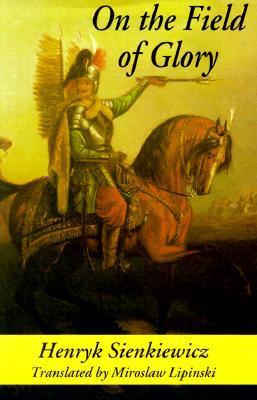
On the Field of Glory Written by Henryk Sienkiewicz Translated by Miroslaw Lipinski The last historical novel by Nobel Prize winner author was to be the beginning of a major sequel to the Trilogy. On the Field of Glory sets the stage for King Jan Sobieski III's victory against Turks in 1683. The novel does include some continuing characters from the Trilogy, along with new characters, which are some of the best in the Sienkiewicz canon. But the promise of a new trilogy was not to be. Sienkiewicz died in 1916. Fortunately, On the Field of Glory is a great read in its own right and represents at least one major point of interest for readers of Sienkiewicz's historical the memorable character of Anulka Sieninska is more fully rendered than any leading ladies of the original trilogy. This translation by Miroslaw Lipinski is a skillful blend of modern English with a touch of suitable antiquity so effective in the original language of Sienkiewicz. The epilogue by the translator provides useful commentary and additional background for a most glorious, in brief, period of Polish history. HENRYK SIENKIEWICZ was born in Poland in 1846. His works include the famous trilogy (With Fire and Sword, The Deluge and Fire in the Steppe). He traveled throughout the world, including two years spent in America, and was awarded the Nobel Prize for Literature in 1905. Quo Vadis, originally published in Poland in 1896, was translated into more than forty languages. Sienkiewicz died in 1916. Publishing Hippocrene Books, New York 2000 Hardcover book measuring 6" x 9" 257 pages English Language Version All books are shipped through the U.S. Postal Office using Media Mail service. Typically delivery times are between 1 and 2 weeks. Please be advised, certain destinations in
Author

Henryk Adam Aleksander Pius Sienkiewicz (also known as "Litwos"; May 5, 1846–November 15, 1916) was a Polish journalist and Nobel Prize-winning novelist. He was one of the most popular Polish writers at the turn of the 19th and 20th centuries, and received the Nobel Prize in Literature in 1905 for his "outstanding merits as an epic writer." Born into an impoverished gentry family in the Podlasie village of Wola Okrzejska, in Russian-ruled Poland, Sienkiewicz wrote historical novels set during the Rzeczpospolita (Polish Republic, or Commonwealth). His works were noted for their negative portrayal of the Teutonic Order in The Teutonic Knights (Krzyżacy), which was remarkable as a significant portion of his readership lived under German rule. Many of his novels were first serialized in newspapers, and even today are still in print. In Poland, he is best known for his historical novels "With Fire and Sword", "The Deluge", and "Fire in the Steppe" (The Trilogy) set during the 17th-century Polish-Lithuanian Commonwealth, while internationally he is best known for Quo Vadis, set in Nero's Rome. Quo Vadis has been filmed several times, most notably the 1951 version. Sienkiewicz was meticulous in attempting to recreate the authenticity of historical language. In his Trilogy, for instance, he had his characters use the Polish language as he imagined it was spoken in the seventeenth century (in reality it was far more similar to 19th-century Polish than he imagined). In The Teutonic Knights, which relates to the Battle of Grunwald in 1410, he even had his characters speak a variety of medieval Polish which he recreated in part from archaic expressions then still common among the highlanders of Podhale. In 1881, Sienkiewicz married Maria Szetkiewicz (1854-1885). They had two children, Henryk Józef (1882-1959) and Jadwiga Maria (1883–1969).